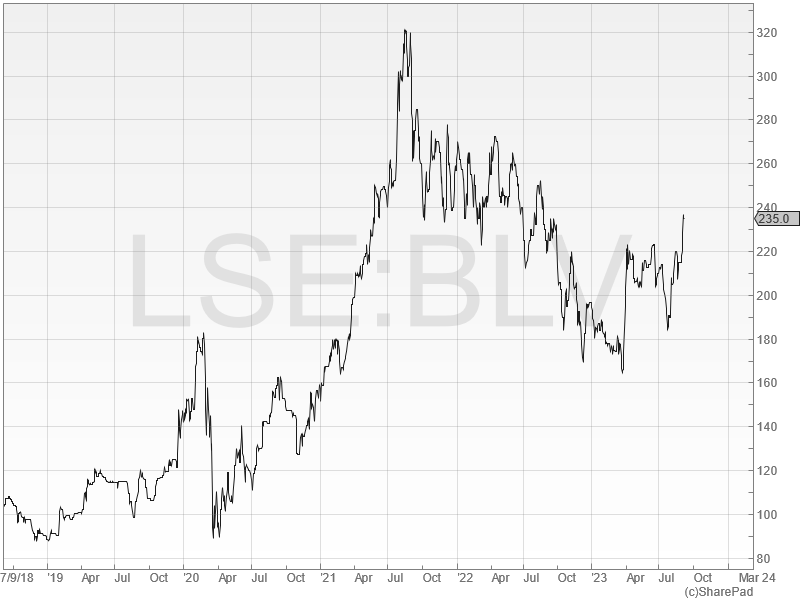Dividend notes: back on the road? DLG, BLV (07/09/23)
Half-year results from Direct Line Insurance (LON:DLG) and small-cap estate agency group Belvoir (LON:BLV) reveal two very different pictures.

Welcome back to my dividend notes. Today I'm looking at a troubled former holding that may be on the road to recovery – and an impressive performer in the property sector.
Companies covered:
- Direct Line Insurance Group (LON:DLG) - I suspect the worst is over for this troubled insurer, but the company has had to sell some attractive assets in order (I suspect) to avoid an equity fundraising.
- Belvoir (LON:BLV) - a solid set of half-year results show remortgaging and letting income picking up the slack from lower property sales. A decent business at a fair price, in my view.
Tip: to search for my previous coverage of a company, enter its ticker code into the search tool at the top of this page.
These notes contain a review of my thoughts on recent results from UK dividend shares in my investable universe. In general, these are dividend shares that may appear in my screening results at some point.
As always, my comments represent my views and are provided solely for information and education purposes. They are not advice or recommendations.
Direct Line Insurance (DLG)
"Looking forward, the improved Motor margins now being achieved should provide a platform to support an improvement in operating profit into 2024."
This troubled FTSE 250 insurance group (a former holding of mine) has released half-year results.
Direct Line says that gross written premium for the six-month period rose by 9.8% to £1,615.2m. However, the group reported a pre-tax loss of £76m, as last year's underpriced motor policies continue to drive underwriting losses.
This is reflected in Direct Line's Solvency Capital ratio, remains slightly below target levels at 147%.
These results highlight two problems – capital strength and motor losses – which acting chief executive Jon Greenwood says are his top priorities this year. He's now confident that fixes for both of these issues are in place and should start to deliver results from H2 onwards.
Capital strength: DLG's solvency ratio of 147% (a regulatory measure of surplus capital) is at the bottom of the group's target range of 140%-180%. I think it's too low to safely support dividend payments. For contrast, rival Admiral had a ratio of 182% at the end of June.
To address this problem, Greenwood has agreed the sale of the majority of Direct Line's commercial insurance business.
Direct Line has agreed to sell its brokered commercial insurance business to RSA Insurance for £520m. This is expected to add a around 45% percentage points to the group's solvency capital ratio, potentially lifting it to around 190%.
The businesses being sold provide a comprehensive range of commercial insurance for UK businesses under the NIG brand, and specialist insurance for farmers under the FarmWeb brand.
These policies are sold through brokers rather than directly, so on this basis the company says the business is non-core. Perhaps. But the sale also means that one of the strongest-performing parts of the business in recent years will be lost.
The operations included in the disposal generated a pre-tax profit of £43m last year. This accounts for the majority of the £58m operating profit reported under the Commercial segment in 2022.
All that will be left of Commercial business are the group's direct sales to small business customers under the Direct Line and Churchill brands.
Comment: The decision to sell the Commercial business is a pragmatic solution. It's allowed Direct Line to avoid a rights issue or placing, which I suspect would have been needed otherwise.
However, I think DLG is losing a decent business with good growth potential. Expansion into commercial insurance has also helped to diversify the group away from the mature and highly-competitive UK motor insurance market.
Motor profitability: Direct Line was caught on the hop by inflation last year and consistently underpriced its Motor policies. Investments in IT and underwriting in recent years failed to deliver hoped-for improvements in pricing ability and margins last year.
Big operating losses in 2022 and H1 2023 are primarily the result of these problems.
Greenwood says that he has been spending (even) more on IT and adding operational expertise to the business. He's now confident that new Motor policies are being written profitably, consistent with the group's targeted 10% net insurance margin.
Pricing has been increased with "significant rate increases" over the half year, such that motor renewal premiums have increased by an average of 25%.
The impact of these price increases will take a while to filter through, but is expected to support a stronger operating profit in 2024.
Comment: this isn't the first time the company has told us that motor margins have been restored. But I suspect that the problems probably have been fixed this time.
Direct Line remains one of the largest motor insurers in the UK. While I have some concerns about the strength of its direct model versus price comparison, I still think it should be a decent business.
Dividends: unsurprisingly, the board has not declared an interim dividend.
Management say that while the sale of the commercial business should be sufficient to repair the balance sheet, they plan to wait until the Motor business is generating surplus capital before resuming dividend payments.
This makes sense to me. The motor business drives the majority of profits and is crucial to the success of the group. Dividends should primarily be funded with surplus capital generated by this core business, in my view.
Outlook: operating profit in 2023 is expected to be "adversely affected" by last year's Motor business. Claims inflation is expected to be in line with expectations, but Direct Line doesn't expect to be able to release much cash from prior-year reserves due to the impact of inlation.
Broker forecasts ahead of today's results suggested earnings of 14.5p per share in 2023. That puts the stock on 12 times forecast earnings at 175p. It's not clear to me if forecasts are likely to change after today's results.
My view
I suspect the worst is now over for Direct Line and shareholders can (probably) look forward to a gradual recovery in profitability.
However, the fixes to the Motor business have not yet been proven. I also continue to have concerns about Direct Line's ability to deliver growth in such a mature and competitive sector.
The disposal of the majority of the commercial division means that the group is now even more dependent than previously on the motor insurance market. This partially reverses previous efforts to diversify into higher-growth markets.
An experienced new chief executive has been appointed and will start work early next year. I plan to revisit the shares when he's in role and look forward to learning more about his plans.
Belvoir (BLV)
"the Group is trading comfortably in line with management's expectations for the year ending 31 December 2023"
Belvoir is currently one of the higher-scoring stocks in my dividend screening results, so I wanted to take a brief look at the latest numbers from this estate agency group.
In common with most other large chains in this market, Belvoir's rising letting income is helping to offset the impact of slowing property sales.
The company's half-year numbers reveal that revenue rose by 3% to £15.9m, with management service fees from franchisees rising by 4% to £5.5m. This increase was driven by an 8% rise in lettings income, offsetting a 9% drop in fees from property sales.
Financial services is also emerging as an important driver of growth, with revenue up by 11% to £8.6m during the six months. Remortgaging demand is helping to offset a reduction in new purchase mortgages.
Overall, lettings generated 58% of the group's gross profit for the half year, with 15% from sales and 21% from financial services (H1 2022: 60%, 17%, 19%).
Pre-tax profit for the half year rose by 10% to £4.4m, with earnings up 3% to 9.0p.
Belvoir reported net cash of £387k at the end of the half year, compared with a net debt position of £2.5m one year earlier.
My sums suggest a half-year operating margin of 26.9% and a trailing 12-month return on capital employed of 22.8%. Both are very respectable figures, in my view.
Dividend: the interim dividend has been increased by 25% to 5.0p per share.
This is consistent with broker forecasts for a full-year payout of 11p, giving a prospective yield of 4.7%.
Outlook: chief executive Dorian Gonsalves remains confident about the outlook for the full year:
"Current pipelines of agreed sales, the level of written mortgage business, ongoing excess demand for rental properties and the incremental revenue from the two recent acquisitions underpin the Board's confidence in Belvoir'sperformance for the second half of the year."
Broker forecasts suggest earnings of 17.1p per share for 2023, pricing the shares on a forecast P/E of 13.
My view
Belvoir doesn't look quite as cheap as it did a few months ago, but the group's resilient profits and diversified business model suggest to me that the valuation remains reasonable.

My sums suggest the shares are trading with a trailing free cash flow yield of around 10%, which looks attractive to me and should provide strong support for the dividend.
I wouldn't have a problem owning these shares, although I would say that rivals Winkworth and Property Franchise also look good value to me at the moment. Both of these firms also benefit from owner management, which Belvoir lacks.
Disclaimer: This is a personal blog/newsletter and I am not a financial adviser. All content is provided for information and educational purposes only. Nothing I say should be interpreted as investing advice or recommendations.
You should carry out your own research and make your own investing decisions. Investors who are not able to do this should seek qualified financial advice. Reasonable efforts are made to ensure that information provided is correct at the time of publication, but no guarantee is implied or provided. Information can change at any time and past articles are not updated.




